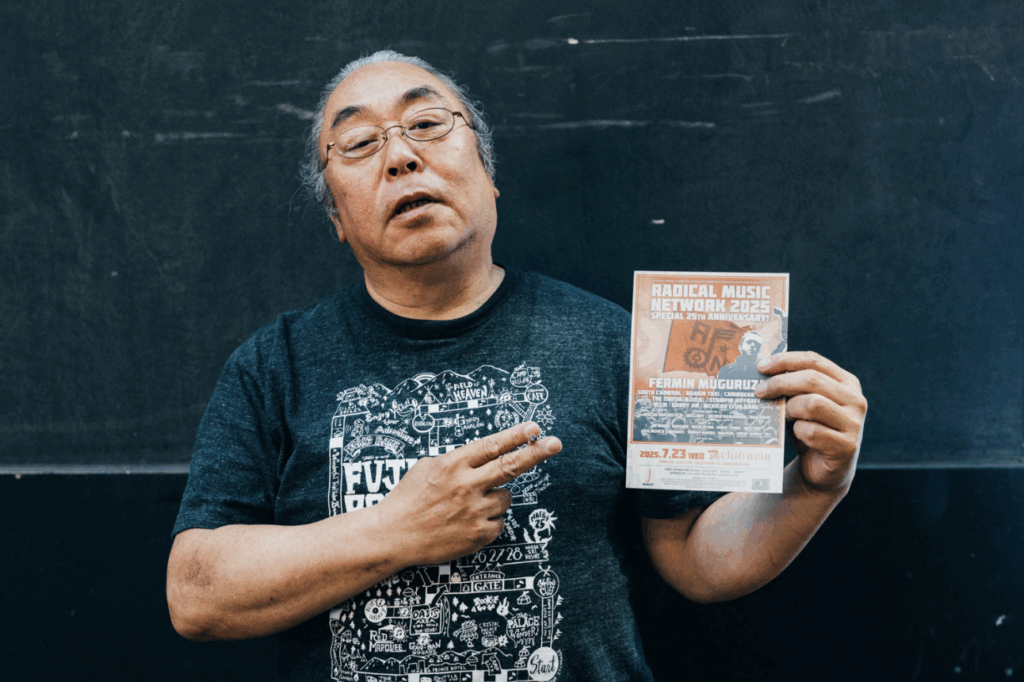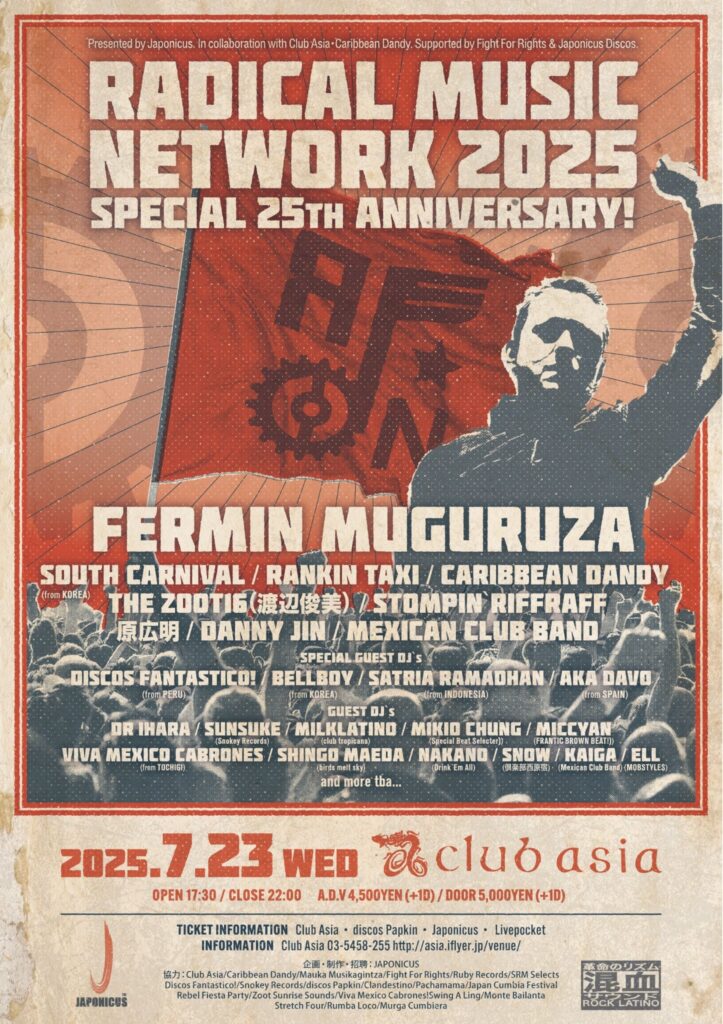25 years with the rocking rebel – Shogo Komiyama
- 7月 4, 2025 ● From Fujirockers.org

Founder of Radical Music Network. (Photo by Kosuke Kobayashi)
Shogo Komiyama has been bringing “rebel music” from Latin America, Europe, and Asia to Japan for 25 years with his Radical Music Network. He believes music and politics are inseparable, and though the road has been difficult, he wouldn’t do it any other way.
─ What made you first come to Japan?
After completing an agricultural program abroad, I moved to Costa Rica and did a rave party in Argentina. Later I got a job at a Japanese food company with offices in Tokyo and Okinawa. It was going pretty well. But I just couldn’t get away from music.
When I decided to make a living from music, my partner in the venture abandoned me after six months. He hung up on me, and all my savings were gone. I even went into debt and had to start from scratch again. But, looking back, I think it was a test. If I didn’t do it at the time, I wouldn’t be who I am today
─ When was your first involvement with Fuji Rock?
It was in 1999. At the time, my childhood friend’s band, Todos Tos Muertos, was coming to Japan, so I went to Narita to pick them up and took them to Naeba.
─ That was when you were still in the food business?
That’s right. Actually, there’s a story behind it. At that time, in 1999, the Mescaleros were performing, so Joe Strummer also came to Fuji.
So I left a message at his hotel. “I’m a big fan. Tomorrow, Todos Tos Muertos will be performing on the Green Stage; if you’d like, please come and join us.” Then I got a faxed reply saying, “I’ll definitely come!”
It was the last show on the Green Stage. Joe Strummer came to watch it. The members were so excited, so we all had beer and alcohol together. After it was over, all the beer backstage was gone, but no one complained. It was that big of an event.
─ What does Fuji Rock mean to you?
It’s a place that changed my life. If I hadn’t met Masa, I wouldn’t be who I am today. If I hadn’t met him, I wouldn’t have been able to work in music.
I’ve been to festivals all over the world, but I really think Fuji Rock is the best in the world. But that’s why I have something to say. I want to say it because I love it. People have high expectations of me, so I want to live up to them.
─ What is important to you when you listen to music?
There is an atmosphere that I can’t describe with words. I think it’s easier to believe something you’ve seen with your own eyes once than something you’ve heard 100 times. That’s why I only trust bands that create a kind of feeling.
Recently, when I watch live performances in Japan, I often feel like they’re good, but they don’t convey anything. On the other hand, unknown bands can be completely amazing. It’s not about technique or skill.
─ How do you judge the feeling or atmosphere of this music?
First of all, I look to see if the person believes in the sound they are making on stage. That’s the basic premise. I listen to the music, but I also listen to whether the person is reflected in the music.
Also, listen to a lot of music. When I go to an outdoor festival, I stay till the end. Some people in Japan only watch the band they like and then go home. I don’t understand this. I watch the whole festival until the end.
This led me to discover a lot of great bands. Recently, I’ve been going to Taiwan, Hong Kong, Singapore, China, Mongolia, and Korea a lot and seeing a lot of bands. Among them, Mongolia has a great identity, and although they play a lot of metal and death metal, they have a lot of really amazing bands.

A preview party for Fuji Rock performers
─ Could you comment on the state of live concerts in Japan?
The Japanese audience watches quietly and gets excited only at the right time or at certain times during the concert. They think this is the right thing to do. But it’s not like that overseas. If the band is not good, the audience will talk, and if it’s good, the people who were talking will shut up in an instant. Music reaches people before language does.
─ Do you believe the atmosphere needs to be right, not just what is happening on stage?
That’s right. We need to be more free. I do events in the street or in bars. The format doesn’t matter. Also, I did an event at a live music venue in Nagoya. A great audience came, but the band didn’t get any money. Who benefits from that? Sometimes only the live music venue makes money.
– Was the event a success?
Of course, we packed the venue. But afterwards, I began to thin that this way of doing things was no longer meaningful to me so I set my own conditions. I’m now confident that I can sell alcohol and get the crowd excited, so I think the compensaton should reflect this fact.
– Do you care about the class of the venue for your performance?
I don’t care at all. You can do it in a bar, a park, or on a street corner. Many people may be surprised when Fermin performs in a small place without a dressing room (laughs). But he is the kind of person who accepts that, so we can invite him. Otherwise, we couldn’t work together. Music should be more open and accessible.
─ In Japan, many people think that you should just “listen” to concerts.
Yes, many people believe this. But I think this is wrong. In the world, music is more of an everyday thing. It’s on the street, in the park, at festivals, and it’s part of life.
─ What is the origin of the name Radical Music Network?
It wasn’t a name that I came up with at first. A writer from a music magazine began to follow our activities and made a feature report on us. At the time, we worked with artists who were still relatively unknown and called it Radical Music Network.
─ Was that the name of an event?
I actually wanted to call it Rebel Music, but no one in Japan knew what the word “rebel” meant at the time. So, we started by using the title of that article as the name of the event.
─ And now it’s been 25 years.
It’s hard to believe, right? But I’m still spreading the word. Anyone can invite bands from the UK and the US. It’s meaningless to do something that everyone else can do. I think that I am the only one that can invite bands from Latin America, Asia, and Europe to Japan.
Masa often said that I was the only fool to hold an event before Fuji Rock, as it is one of the most difficult days to hold a concert. Even so, he said that if you keep going even though you know you are going to fail, there is some value.
This year is our 25th anniversary. There are quite a few artists from the Radical Music Network performing at this year’s Fuji Rock. Fermin Muguruza will be at the White Stage on Saturday. Other than that, there will be some great artists performing at Crystal Palace, so please look forward to these performances.
(Interview & Photo by Kosuke Kobayashi, translated by Sean Scanlan)



